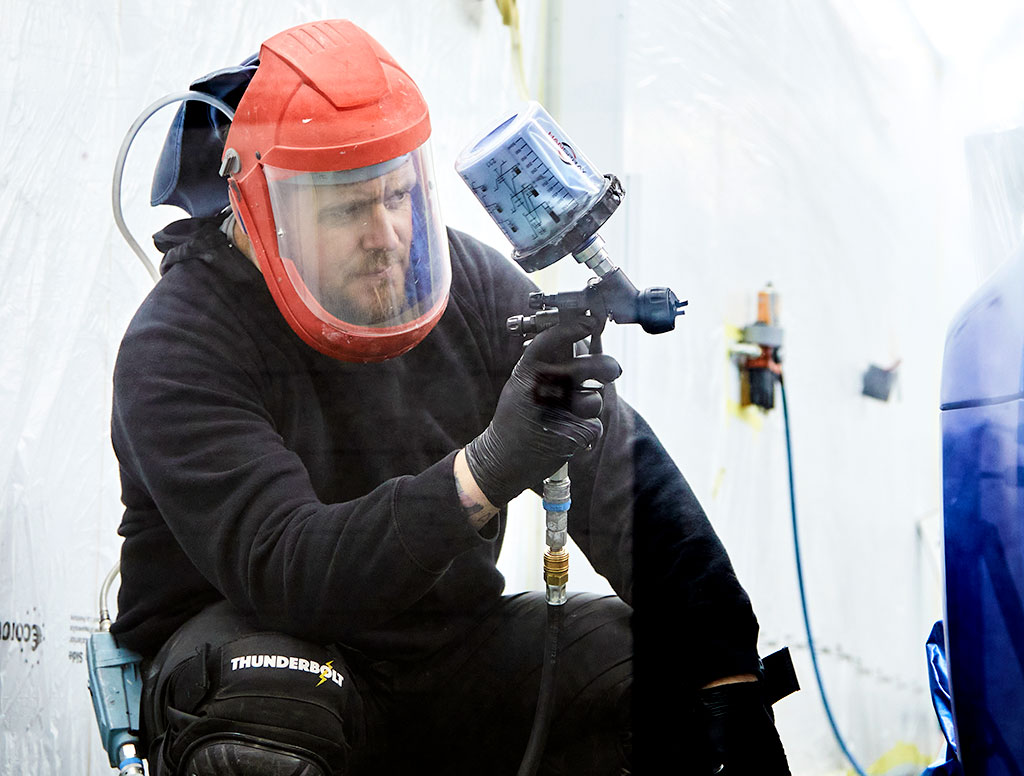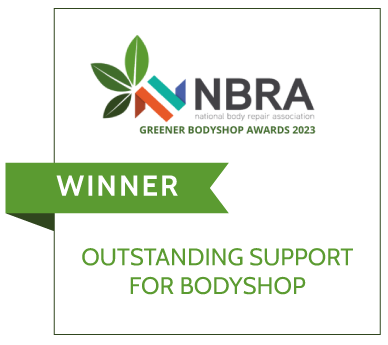Whether we are offering advice for spray booth operators, or our engineers are testing equipment themselves, health and safety remains at the forefront of everything we do – not only for those operating machinery but for anyone who enters the workshop.
Despite legal restrictions having ended for COVID-19 in England, many body shop owners will want to keep up to date on the latest guidance to keep their staff and customers safe. Read on to find the current guidance surrounding spray booth safety in the UK, and learn precisely how to adhere to it.
COSHH Regulation 9 Guidance
Vehicle bodyshop owners must adhere to the COSHH Regulation 9 guidance, which stipulates that they are required to control the risks and exposure to harmful substances. Owners must ensure relevant spray booth laws are followed and equipment is used safely by machine operators to ensure the safety of employees, visitors and any person who has access to the spray booths – as well as paint mixing rooms and use of other equipment such as dust extraction systems and weld fume arms. Spray booth testing is based on Process Guidance note PG6/34(b), which defines how it should be carried out and the levels and types of filtration systems to be used.
Find out more about our spray booth legislative testing services here.
How to know if your spray booth is up to code
There are numerous ways that spray booth manufacturers ensure your spray booth is up to code and that it complies with all spray booth regulations in the UK. Without the following, your spray booth will not be up to regulatory standards.
- Your spray booths need to be constructed of steel, concrete or masonry. They should also be rigidly supported.
- The interior surface of your spray booth should be smooth and non-combustible.
- Any sprinkler systems, visible gauges and alarms in your spray booth should be properly and professionally installed.
- Your spray booth should be designed to sweep air currents towards the exhaust outlet.
- There should be a clear space of at least 3 feet on all sides and above your spray booth.
- There should be clear signs prohibiting smoking, flames and sparks displayed somewhere within 20 feet of your spray booth.
- Any electrical equipment should be properly and professionally rated for use in flammable environments.
- Any portable lamps should be removed from the spraying area or, where possible, enclosed safely.
- Any metal elements of your spray booth (e.g exhaust ducts or piping) must be electrically grounded in a permanent fashion and to professional standards.
- Your spray booth should be sufficiently ventilated during and after all operations to ensure vapours and other potentially harmful chemicals have evaporated.
- Each ventilation unit within your spray booth should have an independent exhaust unit.
- Fans in your spray booth should be made of nonferrous or non-sparking material.
- Any unprotected combustible materials should be at least 18 inches away from any exhaust ducts.
With regard to the above, these measurements are taken care of not only by your spray booth manufacturer (providing they’re a trusted and approved manufacturer), but also by our engineers. During a spray booth service, we take rigorous steps to ensure the above guidelines are being followed.
HSE legislation based risk assessments
All of AGM Services’ spray booth maintenance and repair services are compliant with Health and Safety England’s legislation and are carried out by highly skilled and qualified spray booth engineers. Our engineers perform expert testing per EPA, COSHH PAS125 Kitemark and manufacturer & insurer audit requirements. These engineers undertake regular training and assessments to guarantee they are well versed with current legislation, guidelines and best practice across all types of spray booth testing.
Spray booth legislative testing
Mist clearance testing
Mist clearance tests are carried out annually. They provide a clear indication of the time taken for isocyanate particles to be cleared from the spraybooth. It’s essential to know the exact amount of time it takes to clear the booth as it’s unsafe for someone to enter without the appropriate PPE. To conduct this test, the spray booth engineer fills the spray booth with smoke and accurately measures how long it takes to extract it.
Local Exhaust Ventilation testing
Another test which AGM Services provides is Local Exhaust Ventilation (LEV) tests, which are performed on various workshop equipment such as:
- Spray booth ovens
- Dust extraction systems
- Paint mixing rooms
- Gun cleaning rooms
- Weld fume extraction arms
- Ventilated preparation benches
- Exhaust extraction systems
LEVs reduce exposure to airborne contaminants like dust, mist, fume, vapour or gas in a workplace, to ensure your spray booth is not only safe but functional.
Breathing Air Quality testing
Every AGM engineer is equipped with the latest Factair Breathing Air Quality testing machine. Breathing Air Quality testing is something that demands much more regular testing at a maximum interval time of three months for all respiratory protective equipment.
Covid-19 Workplace Safety
Legal restrictions in England ended on 24th February 2022 and the requirement for employers to consider COVID-19 in their health and safety risk assessment has been removed. Despite this, many business owners will want to continue following public health advice to ensure staff are as safe as possible from the virus. The UK government recommends the following actions to reduce the spread of respiratory infections, including COVID-19:
- Encourage and enable vaccination
- Let fresh air in
- Maintain a clean workplace
Additional high-priority COVID-19 guidance includes:
- Only use personal protective equipment (PPE) where appropriate
- Work with the same team every day
- Arrange workspaces to keep staff apart
- Keep music and other background noise to a minimum
If you are looking to enquire about our spray booth testing or wish to understand how we keep COVID-19 safe during service and maintenance, contact us on 01706 363 585.
Spray Booth Regulation FAQs
What are the requirements for a spray booth?
Spray booths should be made of steel, concrete, or masonry, and should be supported securely and rigidly. Smooth, continuous, and non-combustible interior surfaces are ideal. Sprinklers, visual gauges, and alarms must all be fitted correctly.
How do you stop dust in spray booths?
Keeping all of the spray booth’s doors closed is the simplest and most effective technique to keep dust out of your paint booth. Make sure the spray booth is on and running when you open the doors to bring in the object you’re spraying, so airborne pollutants are pulled into the exhaust filters.
More spray booth maintenance resources
- Is your spray booth ready for life after lockdown?
- How to ensure your bodyshop runs as productively as possible
- DIY spray booth maintenance checklist



